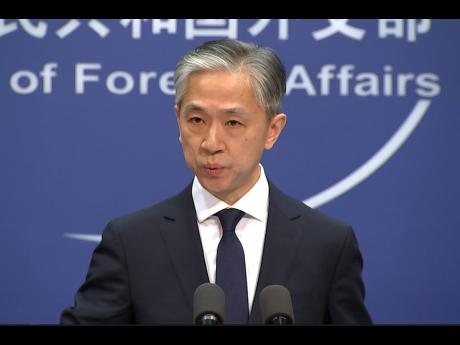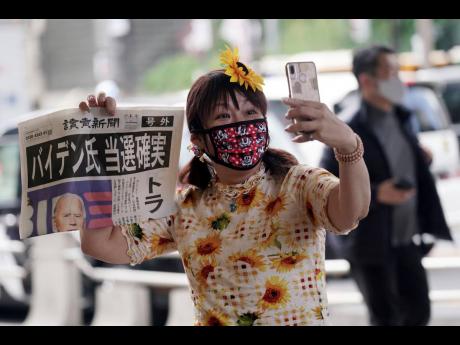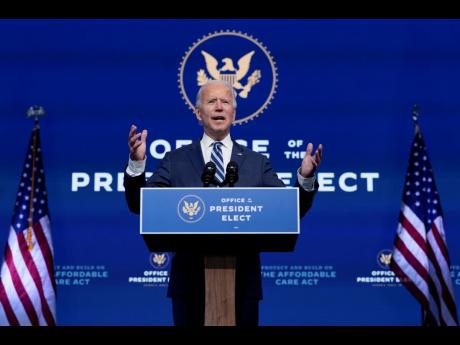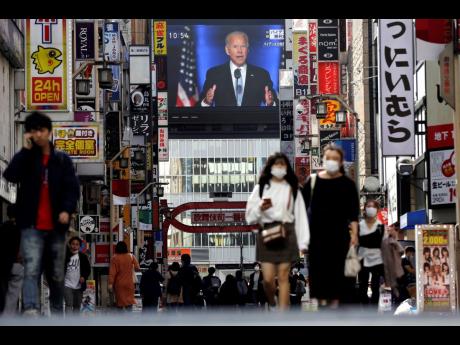Curtis Ward | Biden’s foreign policy: return of American global leadership
(I am confident that when all the votes are counted in the United Stated presidential election, Joseph R. Biden will be elected president.)
President-elect Joseph (Joe) R. Biden’s history of strong support for multilateralism in dealing with global issues has become legendary in foreign-policy circles. That, however, is not to suggest that Biden’s foreign policy would in any way diminish the role of the United States as leading world power. Nor would it obviate the US president’s primary responsibility to protect the national security interests of the United States. As a matter of fact, we shouldn’t expect any wavering of President-elect Biden in that regard. Rather, what we expect, a view well-grounded in Biden’s long foreign-policy history, is that he will return moral values (fairness, respect, care, and honesty) to promotion and protection of international norms, international organisations and institutions in which the US has an invaluable role.
During the years of Donald Trump’s presidency, US role in global affairs diminished considerably, and world leaders could no longer rely on the words of the US president. It will take some time to return the US to the level of trust achieved during President Barack Obama’s tenure, but Biden has a significant advantage. His record as member over two decades of service on the Senate Foreign Relations Committee, and as vice president for eight years to President Obama, will guide his foreign-policy decisions. He will undertake the difficult task of returning trust and integrity in the words of the US president, and he will rebuild confidence in the American president by democratic leaders and governments around the world.
Support for UN and multilateralism
My views are not based on political rhetoric, but rather on my observance over the years of Biden’s foreign-policy record, at least since I started following him in the 1990s. I recall the Senate adopting the Helms-Biden Act in 1999, which Biden, then ranking member of the Senate Foreign Relations Committee, brokered with UN hater Jesse Helms, chair of the committee, thus releasing nearly US$1 billion of arrears in US payments to the UN budget, in particular funding of United Nations peacekeeping operations. Helms used his chairmanship of the committee to block the US payments to the UN over a number of years, and the viability of UN peacekeeping operations was severely threatened. In return, the US made significant progress in negotiating a reduction in US share of the UN budget and UN peacekeeping operations, thus gaining important reforms of the UN.
I recall meeting with then US Ambassador Richard Holbrooke, who led the negotiations to gain broad support for the US proposed reforms of the UN and a reduced share of US budget obligation. Our discussion, which took place in the Indonesian Lounge at UN Headquarters in New York, resulted in Jamaica’s support. Also, while serving on the UN Security Council, I was present when Holbrooke invited Senators Helms and Biden to meet with the UN Security Council to discuss the US relationship with the organisation. While Helms used the occasion to criticise and lambast the Security Council and the United Nations, Biden used his statement to rebut much of Helms’ negative views. Biden expressed confidence in the importance and support for the multilateral organisation and for multilateralism, generally. Biden firmly believes in the value of the United Nations system and believes that US national-security interests are best protected when the US works with the UN and collaborates with international partners in the interest of the international community.
When Biden is sworn in as the 46th president of the United States on January 20, 2021, he will be facing a plethora of dangerous issues on the agenda of the international community, many of which also pose varying degrees of threat to US national security. Many of these issues were exacerbated or created by Trump’s shambolic foreign policy.
Rebuilding trust in US global leadership
Let us take a brief look at some of the most critical issues and what to expect of a president Biden.
Biden’s secretary of state and his ambassador to the United Nations will be faced with the fact that Donald Trump’s withholding of the US’ share of the UN budget is reminiscent of the Helm’s era. The US has again fallen in arrears. They will find an organisation that no longer trusts in the reliability of the United States, which Trump has worked to undermine and marginalise during his tenure as president. Trump’s foreign policy team was characterised as anti-globalism with the singular focus on “America First”. The vast majority of the other 192 UN Member States have lost trust in the United States.
Early in Biden’s presidency, his foreign policy team will have to mend fences and demonstrate his administration’s commitment to multilateralism. They will have to show a resolve to restoring international norms and commitment to reform and support of international organisations and institutions to be better capacitated to serve the international community in the 21st century. They will have to demonstrate that the US can collaborate with its traditional partners and emerging democracies for the maintenance of international peace and security and collaborate on finding solutions to global problems. The US will have to demonstrate its moral capacity to lead.
Candidate Biden said he would elevate diplomacy as the premier tool of US global engagement. That will take significant rebuilding of the professional diplomatic corps. Biden recognises that under Trump, the diplomatic expertise of the US State Department has been eviscerated. Secretaries Rex Tillerson and Mike Pompeo have effectively replaced, or forced into retirement, experienced diplomats and replaced them with a cadre of diplomatic amateurs and partisan hacks. We can expect a complete overhaul of the State Department. Biden said he would rebuild a modern, agile State Department, and that includes “investing in and re-empowering the finest diplomatic corps in the world and leveraging the full talent and richness of America’s diversity”.” That is welcome news.
Biden has promised that when the US hosts the next Summit of the Americas in 2021, he will use “the opportunity to rebuild strong hemispheric ties based on respect for democracy, human rights, and the rule of law”. This will provide an opportunity for CARICOM member states to help shape the agenda in a meaningful way.
Biden is committed to the US rejoining the Paris Climate Agreement “on day one” and has pledged to “lead a major diplomatic push to raise the ambitions of countries’ climate targets”. Biden’s target for the United States is a clean-energy economy with net-zero emissions by 2050. Biden intends to convene a climate summit, soon after taking office, to directly engage the leaders of the major carbon-emitting nations of the world to persuade them to join the US in making more ambitious pledges, exceeding the commitments they have already made. American leadership on climate change augurs well for the entire international community, and the islands of the Caribbean will see significant benefits, including increased US support for climate resilience capacity building. It will be an opportunity to advance further the Caribbean Energy Security Initiative launched by president Obama and guided by then Vice President Biden.
Regional conflicts and global dangers
There are a number of dangerous issues on Biden’s agenda that will have to be dealt with urgently. These include reversing Iran’s development of nuclear materials processing and nuclear weapons development; dealing with the increased nuclear arsenal of North Korea; reducing tensions in the Middle East between Iran and Saudi Arabia, most importantly, ending the proxy war in Yemen; halting the growth of terrorist groups around the world, in particular ISIS and its affiliates in Africa, Asia, and the Middle East; returning balance to US policy on the Palestinian question; and dealing with the crisis in Venezuela. Dealing with these issues will have a greater likelihood of success if done in collaboration with traditional partners.
Also, on the geopolitical and economic fronts, the Biden administration will have to deal with the growth of China’s economic power, in particular China’s growing control of Southeast Asian economies and China’s economic footprints in Latin America and the Caribbean. Also, there are several urgent issues with cybersecurity, in particular Russia’s use of cyberspace to interfere in the democratic processes of liberal democracies. Rising autocratic trends will also attract Biden’s attention. These and other geopolitical and security issues will require future in-depth analysis.
– Curtis Ward is the former ambassador and deputy permanent representative of Jamaica to the United Nations, with special responsibility for Security Council affairs. He also served as expert adviser to the UN Security Council Counter-Terrorism Committee. He is the publisher of The Ward Post, www.thewardpost.com Email feedback to attycward@gmail.com.




